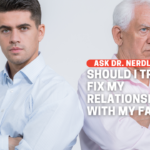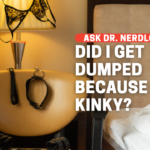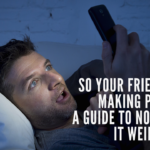Doctor’s Note: today’s column is by Dr. Timaree Schmitt, host of Sex With Timaree and co-host of DTF: Darryl and Timaree Fun Hour. Also updated to add commentary on apologies and making amends.
There have been precious few upsides to the pandemic for me. But one highlight was discovering the You’re Wrong About podcast.
It’s hosted by a pair of journalists obsessed with exposing the way we collectively misremember history- or failed to understand it at the time. They have covered the Kitty Genovese murder (origin of the myth of “bystander apathy”), inner city gangs in the 90s (more a media narrative than a real phenomenon), and even the life of Marie Antoinette (she never said that thing we all think she said).
There is no shortage of topics for the You’re Wrong About podcast to explore, because, let’s be frank: we’ve been wrong about nearly everything, at least initially. As a species we’ve struggled to understand the world, making best guesses and learning bits and pieces over time, through a horrible process of trial and error.
Take the idea of germ theory of disease. It’s the concept that microorganisms and bacteria are responsible for many human illnesses. It was proposed a thousand years ago, but it wasn’t until the end of the 19th century that researchers came to accept that objects too tiny to be perceived by our eyes could be causing so much trouble.
Nowadays we can read about physicians of the 1850s going from performing an autopsy straight to delivering a baby without washing their hands and laugh riotously at the stupidity. How silly of them! How could they not know?
But we’re not smarter for having been born later. We simply don’t know what we don’t know. And until someone discovers something and effectively shares that knowledge, we will continue to not know.
And that’s how I feel about the way I learned about gender, consent and flirting. As a kid, I didn’t find it particularly confusing, because the narratives were actually very simple.
The idea was that women don’t really want to have sex; they just seek love and a partner who can take care of them. Men, on the other hand, want sex and validation and use love as a way to get that from women. Women are responsible for saying no to sex or providing it to those who are entitled to it. A man’s goal is to get access to women’s bodies. If he does, he is revered as capable and masculine, and it kind of didn’t matter so much whether he got that access through seduction, emotional manipulation, wealth, or even force.
This narrative was presented to me from every angle: romantic movies, jokes, the sexuality education I received. It was implicit in the articles in Cosmo and Maxim, song lyrics, and even the academic writings of evolutionary psychologists.
I don’t believe the sources of that narrative meant to harm. I don’t think the writers at FHM were actively thinking, “let’s completely remove all sexual agency from women and actively contribute to a culture that normalizes and excuses sexual assault.” I don’t think that a bunch of ad execs were sitting around a table saying, “I want women to feel preoccupied with being assessed as sexual objects and for men to be completely disengaged from their own emotions and unable to have healthy, intimate relationships.”
I think they were, like all of us, steeped in a culture that is ignorant. We had not yet realized that we need to wash the metaphorical germs off our metaphorical hands.
I was mad about all of this for a very, very long time. But that anger didn’t actually make me feel better and sometimes it was a barrier in being able to educate others. To move forward in my own life, I now embrace forgiveness: for all my favorite movies that told me it was ok to ignore boundaries and be emotionally manipulative for the sake of “love.” I forgive popular songs for normalizing treating people as objects. I forgive my school for assuming we were all straight, cisgender and wanted to get married and work in finance or whatever.
And I try to forgive myself for the ways I was a real douchebag too, hurting people’s feelings and making choices that today fill me with disgust. As a bisexual girl, I internalized both the messages about what to expect of men but also how to treat the women I dated. There weren’t many models of how I, a femme, should approach and romance another femme. So I took a page from the book of the straight dudes whom I thought -at the time- were cool. I was aloof, played games, was inconsiderate of boundaries, and ghosted on perfectly lovely humans. I’m filled with embarrassment at the thought of it now.
Forgiveness doesn’t make any of those actions OK. It’s just saying that no one benefits from carrying around icky anger and shame forever, hauling around baggage like it’s a trove of treasures. We have all been harmed and we’ve all harmed, but we have to keep going. This requires acknowledging that we were wrong and committing to doing better.
A lot of Men’s Rights Activists (and conservatives in general) have a hard time with this. We may have been reared in a similar environment: same country, maybe the same religion or time frame. But instead of grasping that perhaps the culture’s framework around gender was wrong, they double down. Effectively it’s like saying: “if I start being concerned about germs getting me sick now, all the times I didn’t wash my hands: I was being stupid. And it means the sources of information I’ve trusted all my life might be wrong, which makes me feel uncertain and anxious. And we can’t have that.”
When we realize we’ve messed up, the next stop on the train is owning up and making amends. This is critical if we are going to continue to be connected to the person harmed, but a good idea regardless. Apologizing isn’t just about clearing the slate, but about rebuilding trust and establishing myself as a person who is worthy of their time and capable of learning and growing. Doing the work of being vulnerable in this way and attempting to repair damage not only demonstrates to others that we’re serious, but the act is a commitment to our future metaphorically hand-washing selves.
So what should my apology look like?
- It requires a display remorse for having harmed the other person- which is categorically different than being regretful that they’re upset with me.
- Admit responsibility- acknowledging that harm came from my action, regardless of what I intended or why I didn’t think it would be harmful at the time. Explain that I understand what was wrong about the action from their perspective, validating their experience. Skip excuses, minimizing or derailments about how I too have been harmed.
- Attempt to make amends, thinking carefully about what I can do to set the situation right. Let them offer a solution to fixing what was damaged.
- Offer assurance that it won’t happen again and then make an actual plan to avoid a recurrence.
All of this should be offered directly and privately to the harmed person and we have to be ready to hear that they don’t accept the apology. And then we go from there, rededicated to the gameplan.
So what does this mean for flirting, seduction, and managing boundaries now?
First, we can make sure we are clear on the basics of consent, regardless of gender. Most of us get the idea that “no” means “no,” but we’re still working on affirming a “yes,” even in the small ways: offering touch before doing it, even ensuring that people feel free to leave a conversation.
Planned Parenthood has a great acronym for explaining consent: the FRIES model. They explain consent is:
- Freely given
- Reversible
- Informed
- Enthusiastic
- Specific
All our choices must be made freely: without fear of repercussions for saying no, without coercion or the influence of drugs or alcohol. We can revoke consent at any time, even if we have said yes already or engaged in an act before. We communicate and agree on things like condom usage or how we’re going to navigate a risky act and ensure everyone is genuinely on board with what’s happening, not just going along.
This requires that we be truly attentive to the other person, staying present and looking for signs of their enjoyment or annoyance, anxiety, even zoning out. Basically: stay engaged in the conversation (or sexual act) and adjust according to their feedback.
It sounds like a lot of thinking and work. And to be real: it is. But rather than making sexuality more serious or stressful, this model of ongoing communication can make flirting and sex a lot more pleasurable: treating it as a creative, exploratory act, not a competition with a goal. We can derive pleasure from our partners’ pleasure, and collaborate together on flirting or sexual acts, approaching it less like a hunter and prey and more like musicians in a jam session.
And we’re not alone in this endeavor. Not only are there plenty of workshops available (shout out to my friend Vonka who teaches femme flirting), but lots of websites (including this one!) and articles and people you can hire to talk you through this process!
And yes, we’re going to mess up and make awkward missteps. Knowing that it’s part of the process: we’ll apologize, try to set things right and do better going forward. We will also be rejected at some points. But when we approach with a different framework: the idea that sexuality and flirting are ways in which adults can have fun -not as inescapable fates of biology or the source of our validation- we’re liberated. And when we acknowledge that we have much more to learn -and always will- we’re preparing ourselves to adapt more easily.
Going forward, I’m going to be less interested in being “good at flirting” and more interested in being good at listening and showing interest in others. It seems like a good start.
Dr Timaree Schmit has been a sex educator for more of her life than not and is on this planet to bring rational, sex-positive, empirically-based knowledge about sexuality to audiences everywhere. She works as an adjunct professor, guest lecturer, writer, consultant, and host of the Sex with Timaree podcast and co host of DTF: Darryl and Timaree Fun Hour podcast. She is the LGBTQ and Sexuality affairs contributing writer for Philly Weekly and a long-time community organizer in the queer performance scene, and advocate for sex workers rights.







